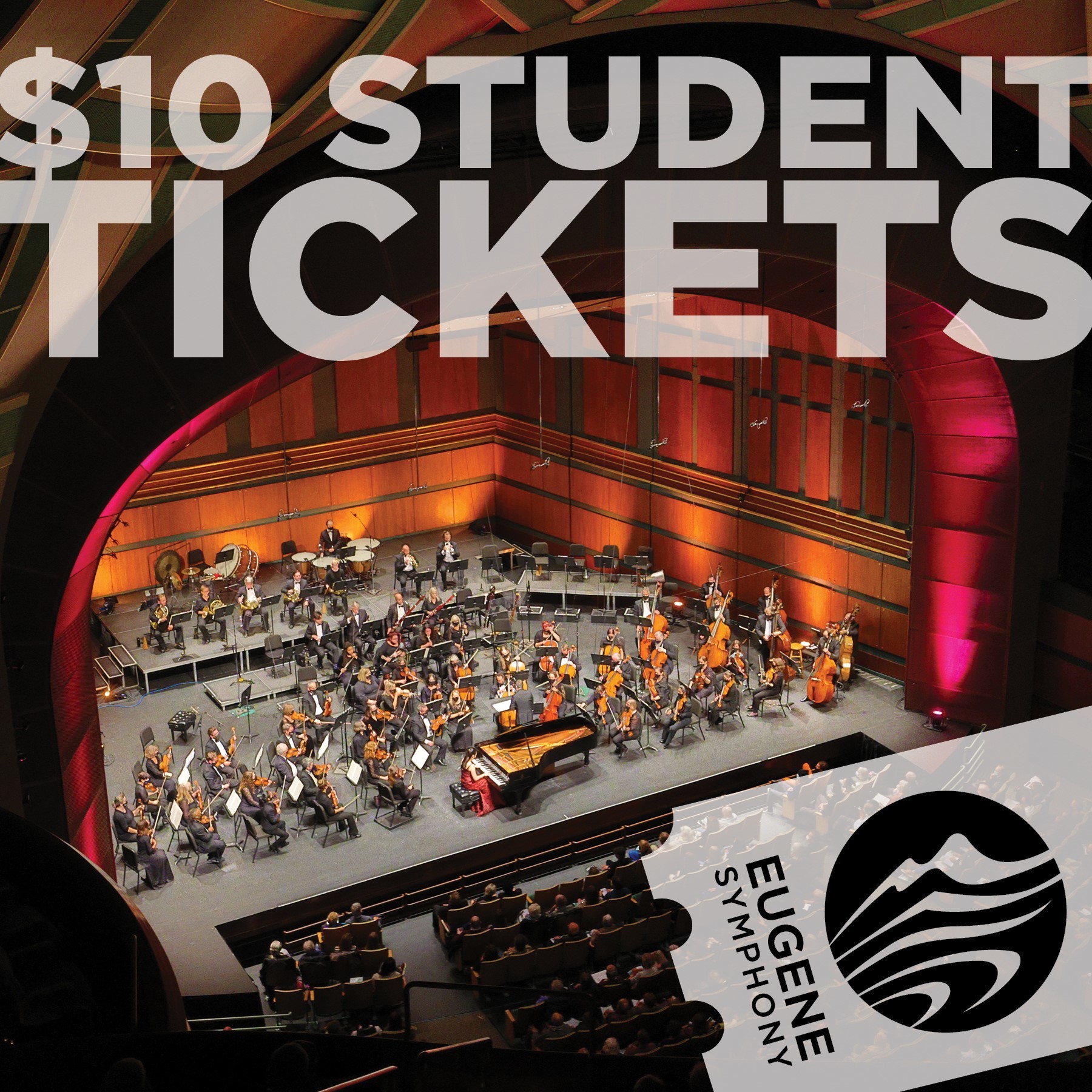Thu April 21 | 7:30 PM
Tristan und Isolde, Act I
Be there for the start of one of the biggest events to hit the Eugene arts scene, as we launch a three-year exploration of Richard Wagner’s opera Tristan und Isolde.
TICKETSApril 21, 2022 7:30 PM
Tristan und Isolde, Act I
Nina Warren, Isolde
Roy C. Smith, Tristan
Ola Rafalo, Brangäne
Gary Simpson, Kurwenal
Tenors and Basses of the Eugene Symphony Chorus
Mahler: Blumine
Wagner: Act I from Tristan und Isolde
Be there for the start of one of the biggest events to ever hit the Eugene arts scene, as we launch a three-year exploration of Richard Wagner’s opera Tristan und Isolde. At once tender and tragic, this deeply personal love story changed the course of classical music, drama, and opera forever…and has only ever been performed in Oregon once, over 50 years ago. Prior to the complete Act I, we’ll hear Gustav Mahler’s luminous miniature masterpiece, and then Francesco will set the stage with a captivating examination of what makes Wagner’s music so moving.
Program subject to change.
Richard Wagner (1813-1883)
Tristan und Isolde
Few composers, if any, have sparked as much controversy and strong feelings – pro and con – as did Richard Wagner. Then again, few composers also had as enormous impact on the course of music history. Of his works, including the gargantuan Ring of the Nibelungs cycle of four operas, Tristan und Isolde perhaps stands above them all in its influence and ability to elicit passionate reactions. Clara Schumann, a contemporary of Wagner and a leading pianist and composer of the age, wrote of it as, “… the most repugnant thing I have ever seen or heard in my life… in which every feeling of decency is violated and by which not only the public but even musicians seem to be enchanted — that is the saddest thing I have ever experienced in my artistic life…” After seeing a performance of it in 1933, British composer Benjamin Britten would record in his diary, “[It] dwarfs every other creation save perhaps [Beethoven’s] Ninth. The glorious shape of the whole, the perfect orchestration: sublime idea of it and the gigantic realisation of the idea. He is master of us all.” Whether positively or negatively, experiencing Tristan und Isolde makes the heart race, eyes widen, and stomach drop.
The work’s story is based on the ancient Tristan legend (probably of Celtic origin), specifically the telling by Gottfried von Strassburg, a 11th-century German author. Another source of inspiration were the events of Wagner’s own life — the composer had participated in the failed May Revolution in 1849 and was forced to flee Dresden to avoid arrest, taking refuge in Zürich. There, he befriended a retired silk merchant, Otto Wesendonck, who supported Wagner for several years, freeing the composer of financial concerns and allowing him to dedicate his time to composition and performing his music around Europe. While living on the Wesendonck estate in 1857, a love affair developed between Wagner ( a married man) and Wesendonck’s wife, Mathilde. That year, Wagner set aside work on what would become his fabled Ring cycle to begin working on Tristan und Isolde, which he completed two years later in 1859. Every aspect of the work — including its poetry, music, orchestration, and story — was laid by the composer’s hand.
It is difficult to fully comprehend the impact that the opera had not only on music but on art as a whole. Before it, composers had followed rules grounded in logic and carefully maintained relationships between tonal centers. Tristan und Isolde completely disregarded these rules, which had been followed for hundreds of years, laying the foundation for the dissonant and atonal music of the 20th-century. The result is a feeling of constant striving that never reaches a resolution, conveying the psychological state of the two titular characters and their unfulfilled desire for each other. The demands upon the singers and their voices were unprecedented, making these roles among the most difficult to execute in all of operatic canon. Beyond music, it was greatly influential in the work of theater, poetry, and visual art into the late 19th and 20th centuries. Author Alex Ross describes Tristan und Isolde as “[having] set the course for an avant-garde art of dream logic, mental intoxication, formless form, limitless desire.”
In all, it is difficult to point to a singular work that changed the course of Western Classical music more than Tristan und Isolde. Whether this change was for the better or for the worse depends upon whom you ask. Even without a knowledge of music and its history, the gravity and chaos that it radiates is undeniable — one only needs to listen.
Act I
The sonic identity of Tristan und Isolde begins immediately in its Prelude with a quiet line by the cellos, who leap up an interval, and slither down chromatically into a dissonant chord with the woodwinds. Particularly effective in these opening measures is Wagner’s use of silence — even when sound is not present, tension is building. The orchestral introduction feels as though it is constantly building, heading towards a resolution that it never reaches. We will hear this music again at the end of this first Act.
The first scene opens on a ship, with a sailor’s song. Isolde and her handmaiden Brangäne are being transported by Tristan to be married to his uncle, King Marke of Cornwall. Isolde is furious at the loss of control of her own fate, particularly directed towards Tristan who has refused to interact with her during the journey. Isolde’s bursts of anger are heard in blaring brass and trembling strings, with interludes of calmer music as Brangäne attempts to console her.
We meet Tristan, along with his faithful but nasty servant Kurwenal. Isolde sends Brangäne to instruct Tristan to come to her, an order he ignores. Kurwenal mocks Isolde with the death of her fiancée, Morold, who was killed by Tristan. Kurwenal’s indecent boastfulness is underscored by the rustic nature of the music, with plucking strings and bouncing brass. The servant’s gleeful mocking of Isolde is taken up by the entire crew of the ship, with the men’s chorus joining in, laughing and celebrating their hero Tristan. Brangäne returns to Isolde who, trembling with rage, recounts the story of how a wounded Tristan, disguised as a man named “Tantris,” came to her to be healed and how she recognized him as the killer of her betrothed. She took up his sword, intending to avenge Morold, but is stopped as Tristan looks into her eyes. As she recounts the story, we hear the music transform from anger to hints of music from the Prelude, now filled with longing. Isolde allows Tristan to leave with the promise that he will never come back, a promise he breaks when he returns to deliver Isolde to his uncle. She is snapped back to reality, regretting that she allowed the sword to drop and did not slay Tristan. Brangäne, continuing her attempts to console her mistress, reminds her of magic potions Isolde’s mother made, suggesting that a love potion could bring Tristan over to her side. To Brangäne’s horror, Isolde chooses the death potion instead.
Kurwenal appears, commanding the women to prepare for the voyage to end. Isolde says she will not leave the ship and meet the King unless Tristan agrees to meet with her, drink atonement, and ask for her forgiveness for breaking his promise. As Tristan arrives, Isolde orders Brangäne to prepare the death potion, ignoring the handmaiden’s protestations. A music interlude ensues as Tristan approaches — there is a sense of impending doom in the foreboding sound of the horns and trombones. Hints of the Prelude’s music are heard in the strings.
Upon his arrival, Isolde tells Tristan that she saw through his disguise as “Tantris” and demands revenge for his treachery. Tristan offers her his sword, inviting her to kill him. Isolde refuses, insisting he must drink atonement and that doing so will cleanse him of any guilt. Tension builds as offstage sailors’ voices announce that the journey is almost at an end. Tristan drinks half of the potion and Isolde drinks the rest, but instead of bringing death, the two are consumed by rapturous love for each other. The music from the Prelude makes its full return as the potion’s effects consume the two characters, building into a frenzy. At the same moment, Kurwenal and the sailors announce the arrival of King Marke. Isolde asks Brangäne which potion she prepared, who confesses that in her desperation, she switched out the death potion for a love potion.
Program notes by Conducting Fellow Daniel Cho
Health & Safety
The health and safety of Eugene Symphony audience members, musicians, and staff members has been and will always be our top priority. We strongly welcome and encourage patrons who wish to continue wearing masks while attending performances to do so. We want all of our attendees to feel comfortable and accepted in your choice. You take care of you, we'll take care of the music and ensuring that your experience attending a Eugene Symphony concert remains exceptional.
For the most up to date health and safety protocols for our concerts, visit our Eugene Symphony Safety page.
LOCATION: Hult Center for the Performing Arts



